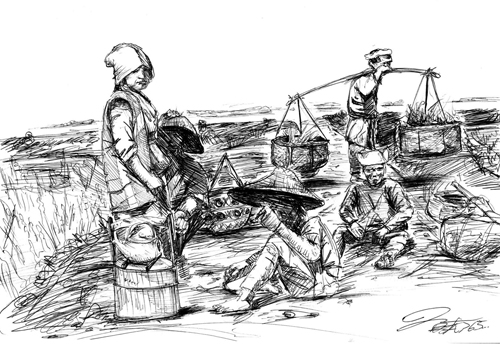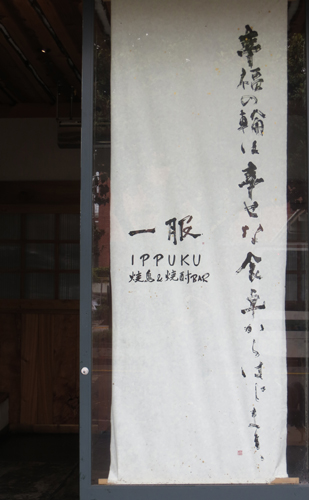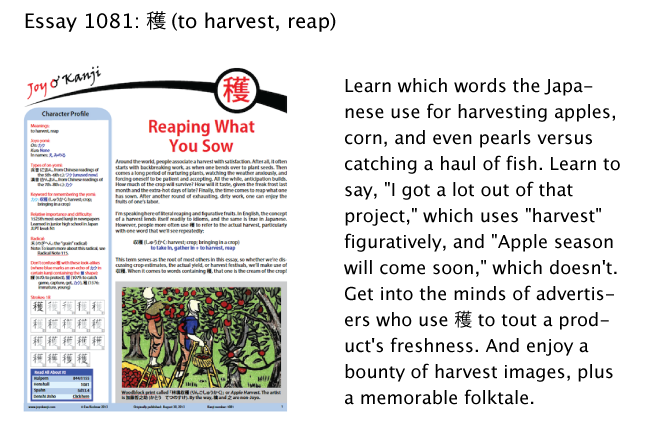Ippuku
A beautiful restaurant in Berkeley has been driving me crazy. Every time I walk by this izakaya (居酒屋, いざかや: bar, pub), I see three panels filled with gorgeous kanji. I can never make out what they are, and I inevitably fail to have a camera on me.

Photo Credit: Eve Kushner
That changed this week, thanks to several bits of serendipity.
Things started to happen when I met artist J Muzacz on Twitter. I promptly checked out his first book of Japan-related drawings and felt an urge to incorporate his art into my work. He affably agreed.
I then realized that his forthcoming book of illustrations is entirely about a sugarcane harvest on Ishigaki Island (which is in the same island chain as Okinawa). I was just about to publish essay 1081 on 穫 (to harvest, reap), which in fact came out today. What luck! I've included two of his sugarcane images in that essay, as well as this one from his first book:

Image Credit: J Muzacz
Working from a photo that dates back to the middle of the Meiji era (1868–1912), Muzacz rendered this drawing with a ballpoint pen. Below the image he has provided the following Japanese caption:
野良仕事で一服。当時の農民たちの生活がわかる。
A short rest from farm work. In those days, this was how farmers lived.
野良仕事 (のらしごと: farm work); 一服 (いっぷく: short rest);
当時 (とうじ: in those days); 農民たち (のうみんたち: farmers);
生活 (せいかつ: living, livelihood)
I shared this caption with my proofreader, who made a fascinating point. See how the seated man with the conical hat seems to be smoking? The term 一服 can mean “one smoke (of tobacco),” which is likely one cigarette. People often smoke when taking a break, so 一服する came to mean “to take a short rest.”
Ah, 一服. That's the name of the Berkeley restaurant! I knew the time had come; I needed to find out once and for all what those panels said. My proofreader came to the rescue, but even he isn't entirely sure what some of the characters are, as they're so "stylized." That's his word. Mine would be "messy." Anyway, I'll now present the Ippuku panels one by one, along with his skillful translations.

Photo Credit: Eve Kushner
Under 一服 and its romaji rendering we find this written horizontally:
焼鳥&焼酎BAR
Yakitori & Shochu Bar
焼鳥 (やきとり: chicken pieces grilled on a skewer);
焼酎 (しょうちゅう: Japanese liquor similar to vodka)
What an interesting repetition of 焼! I would not have expected those words to start with the same kanji!
Here's the vertical part:
幸福の輪は幸せな食卓からはじまる
The ring (or chain) of happiness starts from a happy table.
幸福 (こうふく: happiness); 輪 (わ: ring); 幸せ (しあわせ: happiness);
食卓 (しょくたく: dining table); はじまる (始まる: to start)
There's lots of happiness in that sentence!
Moving to another panel, we find ... a rooster!

Photo Credit: Eve Kushner
Ah, that brings us back to 焼鳥. Somehow I never noticed the rooster till just now, even though I took this picture!
Each column begins with a large 食, which seems like a not-so-subtle command to eat! Here's what the text says:
食はきみとぼくをつなぐ
Cooking connects you and me
食* (しょく: cooking); きみ (you); ぼく (me (for males));
つなぐ* (繋ぐ: to connect)
食は心と心をつなぐ
Cooking unites hearts
心* (こころ: heart)
食はいのちをめぐみのいろにそめ
Cooking colors our lives with blessings
いのち (命: life); めぐみ (恵み: blessing);
いろ (色: color); そめる (染める: to dye, to color)
On the final panel (actually, the middle one), we find the rest of the rooster's tail (!) and more odes to food:

Photo Credit: Eve Kushner
Here's what the text says:
食は笑顔をもたらし
Cooking brings smiles
笑顔 (えがお: smiling face; smile); もたらす (to bring)
食はひとの絆を深め
Cooking strengthens people's bonds
ひと (人: people); 絆 (きずな: bonds, a non-Joyo kanji);
深める (ふかめる: to deepen, heighten, intensify)
食は愛をはぐくみ 食は会話をはぐくみ
Cooking nurtures love, cooking nurtures conversations
愛 (あい: love); はぐくむ* (育む: to raise, bring up);
会話 (かいわ: conversation)
食は国と国をつなぎ 食は世界をつないでいく
Cooking unites countries, cooking gradually unites the world
国* (くに: country); 世界 (せかい: world)
The last string of hiragana, つないでいく, corresponds to 繋いで plus -いく (from 行く), a suffix that implies gradual change.
Such passion and optimism! And just imagine—it's about something other than kanji! But clearly this restaurant adores kanji because they're presenting a kanji-covered "face" to the world. Well, that and a big rooster!
Here's a preview of essay 1081 on 穫 (to harvest, reap):

Have a great weekend!

Comments